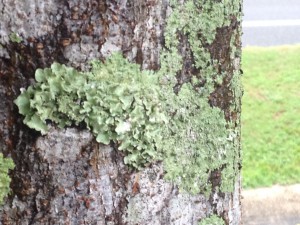Throughout the year I get calls asking about this mossy-like stuff growing on the bark of trees. For the most part, the calls are in the spring time when people have come out of winter hibernation and see their landscape plants covered with this alien figure. I am here to say that it is not an alien figure, though it may look like it is. These are lichens.
Lichens often get mistaken for some unusual fungus that is killing trees. However, lichens are not single organisms, but rather a combination of two organisms that live together in a mutually beneficial way. There are over 20,000 different types of lichens found in nature. Lichens consist of a fungus and an algae; the fungus is more dependent upon its algae partner which produces enough food for both to survive. Lichens are very different from plants in that they can survive a complete body water loss. During this time, brittle pieces that flake off can later grow into new lichens. When moisture becomes available again, the lichen absorbs water and returns to its fleshy form.
The lichens growing on trees and shrubs are not parasites and do not harm the plants in any way. The lichens use the landscapes as a structure to become established.
There are four different forms of lichens found, crustose (crust-like, growing tight against the substrate), squamulose (tightly clustered and slightly flattened pebble-like units), foliose (leaf like, with flat sheets of tissue not tightly bound), and fruticose (free-standing branching tubes). Colors range from white to gray, green, red, yellow, and black. Lichens commonly found in our area are in the crustose, foliose, or fruticose form, and are white, gray, or gray-green in color.
Because lichens produce chemicals, they have very few natural predators. However, the most serious threat to lichens is air pollution. Most lichens will not grow in a polluted atmosphere and therefore you should be glad to see lichen here or there in your yard, as this is an indication that the air is relatively clean.
- Vegetable Garden Insect and Disease Management - June 10, 2015
- Insect Problems in the Heat of Summer - May 8, 2015
- Gardening in a Bucket - April 14, 2015

